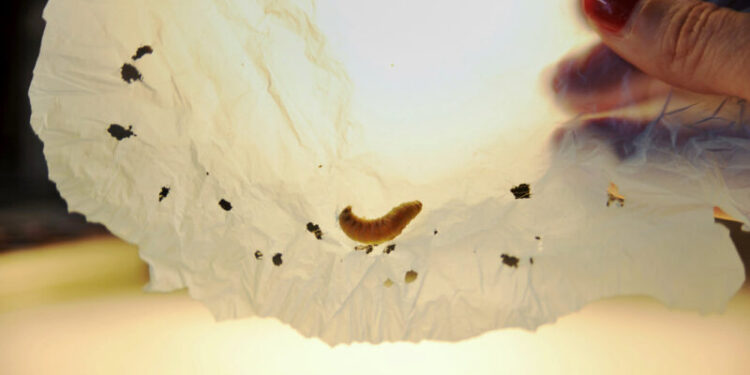Meet Dr. Federica Bertocchini, a Spanish biologist doubling as an amateur beekeeper. While cleaning out her hives, she noticed hive-damaging worms eating the beeswax and started to remove them. After tossing the worms into a plastic bag, she spotted small holes in it. Dr. Bertocchini examined the holes, and realized that the worms were feasting away at the plastic! Her biologist instincts kicked in, spurring her to bring the worms into a lab.
The Galleria mellonella larvae, also known as the “wax worm,” can seemingly “eat” polyethylene, one of the longest-lasting plastics that is very simple to make but hard to break down. Subsequent tests revealed the capability of these worms to chemically dissolve plastic at an unprecedented rate. What gives this worm such an ability? It turns out that beeswax and plastic are both composed of long chains of carbon, which allows phenol oxidase enzymes in worm saliva to oxidize and destroy these polymers. But the worms don’t care about this technical jargon — to them, it’s just another tasty treat.
Instead of raising millions of baby worms and letting them wander leisurely through plastic paradise, a more practical solution would be to harvest and replicate these enzymes for plastic degradation. As the team’s discovery gathers attention, Dr. Bertocchini suggests that water-based enzyme solutions could be implemented by waste processing plants or at-home plastic waste kits, establishing a wider distribution of this game-changing technology. With the participation of families all around the world, a trickle can become a torrent. What’s left would only be natural components, such as ketones or alcohol, deemed safe for release or reuse in other processes.
Although using wax worm saliva to dissolve plastic might not be a widespread solution for decades to come, it shines a light on sustainable ways to reduce waste. Bio-recycling, which uses nature to make resources from waste, has gained recognition as more people realize the efficiency of these methods. These little worms seem to be acting as messengers, reminding us to live in harmony with nature.
Works Cited
Bromwich, Jonah Engel. “A Very Hungry Caterpillar Eats Plastic Bags, Researchers Say.” The New York Times, 27 April 2017.
Diaz, Johnny. “Dead Whale, 220 Pounds of Debris Inside, Is a ‘Grim Reminder’ of Ocean Trash.” The New York Times, 2 Dec. 2019.
McGrath, Matt. “‘Humble’ Worm Saliva Can Break Down Tough Plastic.” BBC News, 5 Oct. 2022.
Sanluis-Verdes, A., et al. “Wax Worm Saliva and the Enzymes Therein Are the Key to Polyethylene Degradation by Galleria mellonella.” Nature Communications, 4 Oct. 2022.



















